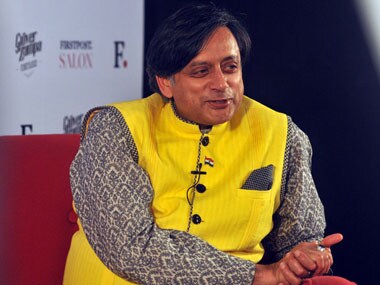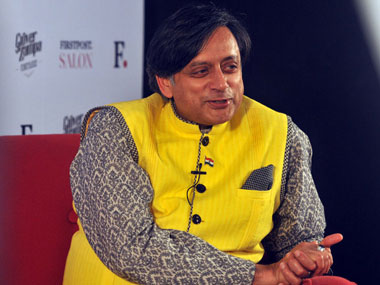The former under-secretary general of the United Nations, distinguished writer and essayist and controversial Member of Parliament, Shashi Tharoor, has in an Oxford University debate argued that the demand for reparations for British colonization of India is not outlandish; it is, in fact, a moral debt. According to Tharoor, after the arrival of the British, India went from having 27 percent of the world trade to less than 2 percent. He added that India provided numerous soldiers for World War I and II, funded these wars through taxes as well as supplied ammunition and garments. He also spoke about how Britain’s industrialization was built on the labor and capital from India. Tharoor then posits, “It’s a bit rich to oppress, enslave, kill, torture, maim people for 200 years and then celebrate the fact that they are democratic at the end of it. We were denied democracy, so we had to snatch it, seize it from you.” Watch the video here.
I would argue that it is Tharoor’s assertions that are rich. This is not to imply that British Colonialism was an unalloyed good, or even exonerate and whitewash it but rather put things into perspective. Colonialism was morally and politically repugnant; it should and must be condemned and never allowed to be repeated. But to hold a nation and a people that had nothing to do with it responsible and culpable for the odious practice is equally bad. So why is Tharoor taking the British on a guilt trip? What accounts for this? Is it morally correct? Shashi Tharoor’s academic credentials are impeccable; he also has a stellar career to boast of. But the man essentially ‘cut his teeth’ in the West. (Ironically but perhaps naturally , Tharoor employs a very Western idiom to chastise India’s erstwhile colonial masters). Tharoor ‘discovered’ India in the West; he wrote tomes about it. In one of his books, Tharoor typically describes his rather ungainly experience with a hotel receptionist in Delhi and then claims to love India, warts and all. He even takes on VS Naipaul and asserts that Naipaul’s critiques of India are anecdotal. [caption id=“attachment_2363104” align=“alignleft” width=“380”]
 Shashi Tharoor. Image courtesy: Sachin Gokhale.[/caption] Tharoor’s nationalism and his admiration or even adulation for India is writ perhaps in all of his works. The point of delineating briefly some of the themes of Tharoor’s works is that the man’s intellectual and emotional evolution correspond to type: they reflect the ambivalence inherent in an upper or middle class person from the East who receives an education in the West. It is this ambivalence that is at work in Tharoor’s trial of Britain. A born again Indian finds reason to fault the British and feels good about it. There are some flaws in Tharoor’s argument. First, it was not British colonialism per se that was responsible for the poor performance and regression of India’s economy. The structure of the world economy (some would even say, global economy) was changing. This axiomatically entailed a shift in the terms of trade. India, like other asian states, probably could not cope up and its terms of trade and economic growth took a steep dip. (Obiter Dictum, the structure of the world economy has again changed and the erstwhile decolonized are gaining from the trend. Who is to cop blame or take credit for this) This is admittedly a reductive counterpoint to Tharoor’s bad economics. Let me now analyze and assess Tharoor’s political point. Tharoor asserts that, ‘ we were denied democracy, so we had to snatch it, seize it from you’. Really? Democracy is a very Western concept and idea. So is nationalism which Tharoor alludes to by saying,’ we had to snatch it..’. It was the gale of nationalism that swept the West or the then imperial metropoles that percolated to the non western colonized world that made the ‘native’ leaders self aware and conscious. These native leaders then, again perhaps from a sense of aggrievement( experience of racism and marginalization in the West and its projection onto their peoples or in some instances genuine empathy) or a nouveau sensibility gained in the West, the moral outrage accruing from this resisted against colonialism. But key here is that the idiom employed was very Western. Two and two does not then make four in Tharoor’s schema and formulation. Now let me make a broader point: colonialism and imperialism are perhaps are as old as history or more accurately modern history. Most nations or peoples have been perpetrators and perpetuators of either. If reparations are held to be a ‘moral debt’, our imagination would stretch itself in apportioning blame and seeking reparations. Colonialism , to repeat, was an odious concept and practice. The world has , in most senses, moved on. The contemporary world is defined by fluidity and porosity where even the post Westphalian construct, the nation state, is also in transition. The nation state in the non western world was a product of decolonization. If this construct is not set in stone, then perhaps older constructs and concepts, which lead to an ‘Us’ versus ‘Them’ mentality also lose their salience. The world is in transition. We are perhaps on the cusp of something unknown. Prudence suggests that we do not become willful prisoners of the past but move on in an idiom that is bold and beautiful. The world that is taking shape brooks no facile identity based distinctions. Let’s not obstruct this but hold hands and forge a glorious future.
Shashi Tharoor. Image courtesy: Sachin Gokhale.[/caption] Tharoor’s nationalism and his admiration or even adulation for India is writ perhaps in all of his works. The point of delineating briefly some of the themes of Tharoor’s works is that the man’s intellectual and emotional evolution correspond to type: they reflect the ambivalence inherent in an upper or middle class person from the East who receives an education in the West. It is this ambivalence that is at work in Tharoor’s trial of Britain. A born again Indian finds reason to fault the British and feels good about it. There are some flaws in Tharoor’s argument. First, it was not British colonialism per se that was responsible for the poor performance and regression of India’s economy. The structure of the world economy (some would even say, global economy) was changing. This axiomatically entailed a shift in the terms of trade. India, like other asian states, probably could not cope up and its terms of trade and economic growth took a steep dip. (Obiter Dictum, the structure of the world economy has again changed and the erstwhile decolonized are gaining from the trend. Who is to cop blame or take credit for this) This is admittedly a reductive counterpoint to Tharoor’s bad economics. Let me now analyze and assess Tharoor’s political point. Tharoor asserts that, ‘ we were denied democracy, so we had to snatch it, seize it from you’. Really? Democracy is a very Western concept and idea. So is nationalism which Tharoor alludes to by saying,’ we had to snatch it..’. It was the gale of nationalism that swept the West or the then imperial metropoles that percolated to the non western colonized world that made the ‘native’ leaders self aware and conscious. These native leaders then, again perhaps from a sense of aggrievement( experience of racism and marginalization in the West and its projection onto their peoples or in some instances genuine empathy) or a nouveau sensibility gained in the West, the moral outrage accruing from this resisted against colonialism. But key here is that the idiom employed was very Western. Two and two does not then make four in Tharoor’s schema and formulation. Now let me make a broader point: colonialism and imperialism are perhaps are as old as history or more accurately modern history. Most nations or peoples have been perpetrators and perpetuators of either. If reparations are held to be a ‘moral debt’, our imagination would stretch itself in apportioning blame and seeking reparations. Colonialism , to repeat, was an odious concept and practice. The world has , in most senses, moved on. The contemporary world is defined by fluidity and porosity where even the post Westphalian construct, the nation state, is also in transition. The nation state in the non western world was a product of decolonization. If this construct is not set in stone, then perhaps older constructs and concepts, which lead to an ‘Us’ versus ‘Them’ mentality also lose their salience. The world is in transition. We are perhaps on the cusp of something unknown. Prudence suggests that we do not become willful prisoners of the past but move on in an idiom that is bold and beautiful. The world that is taking shape brooks no facile identity based distinctions. Let’s not obstruct this but hold hands and forge a glorious future.
)